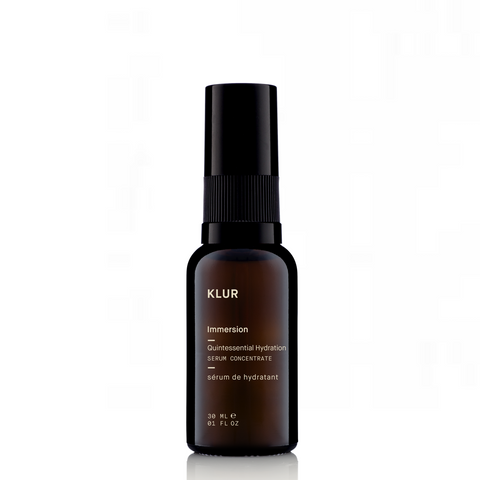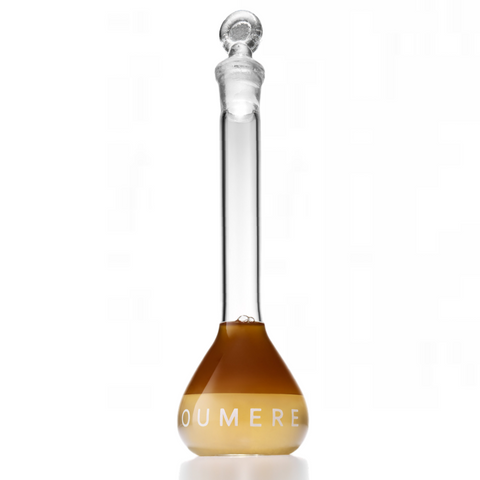How Beta-Glucan Hydrates, Soothes & Slows Aging
April 07, 2021
Hyaluronic Acid seems to be the first ingredient that pops into mind when most people think about hydrating ingredients. However, although lesser known (yet), Beta-Glucan has garnered a reputation for itself lately thanks to its all-round skincare benefits, which encompasses hydrating, soothing, and plumping skin, anti-aging, as well as fortifying the lipid barrier and boosting immunity.
So what exactly is beta-glucan, and what benefits does it really provide for the skin?
____________________________________
What Is Beta-Glucan
Beta-glucans, or β-glucans, are polysaccharide sugars found in cell walls of various mushrooms, algaes, yeasts or oats. They have long been used for health and medicinal purposes to treat conditions like high cholesterol, high blood pressure, diabetes, and even cancer, as their ability in increasing the activity of macrophage (scavenger cells that essentially search for and destroy pathogens) helps to protect the body from pathogens. In skincare, these macrophages help to speed up wound healing and soothe the skin by reducing inflammation.
Beta-glucans also provide intense hydration as they can penetrate the epidermis and dermis while forming a thin film on the skin to lock in moisture. What’s better, they are also rich in antioxidants and are known to have no side effects! This is especially helpful for people with dry, sensitive, and inflammatory skin, including eczema, dermatitis, and rosacea.
So why is it not found as much in skincare products as hyaluronic acid? For beta-glucan to perform as well as it should for the skin, it must be stripped away of the fats, proteins, chitin, and glycogen during the extraction process, making it challenging, complicated, and expensive. Thus adding beta-glucan to a formula could significantly raise the manufacturing cost of a product, as opposed to say, hyaluronic acid.
____________________________________
Beta-Glucan’s Skin Benefit 1: Intense Hydration
Hyaluronic acid is a humectant, and can hold up to 1,000 times its weight in water as it pulls water from the environment to the surface of the skin. However, it is known to have a large molecular weight and therefore does not easily penetrate the skin, and when they are broken down into very low molecular weight ( ≤ 25 kDA), it can potentially carry bacteria and other unwanted ingredients more deeply into the skin. If you have compromised skin, this might be bad news, as that could mean blemishes, redness, irritations, and inflammations. Studies have shown hydration tends to teeter off after 2%, and anything more than that can actually be drying to the skin (note: this is not to say hyaluronic acid is a bad ingredient, you just have to be careful of the molecular weight and concentration used in a formula).
On the other hand, although also a powerful humectant, beta-glucan can penetrate both the epidermis and dermis while forming a thin film on the skin to lock in moisture. In fact, studies have shown that beta-glucan is 20% more hydrating than hyaluronic acid at the same concentration.
Product Recommendation
EATH LIBRARY
The Bright Recovery Brightening Overnight Mask <- Click to shop
____________________________________
Beta-Glucan’s Skin Benefit 2: Calm & Soothe Irritated, Inflamed Skin
Studies have shown that beta-glucan helps in the treatment of dermatitis, eczema, rosacea, irritations, acne, wounds, and burns. The common denominator of these conditions is a disrupted lipid barrier, which means the skin is unable to hold in water nor block out bacteria and irritants. Beta-glucan is able to link together on the surface of the skin to form a thin, permeable film, which helps to lock in moisture and shield the skin from these unwanted stressors, while allowing the lipid barrier time to repair itself.
What's more, because beta-glucan can stimulate the activity of macrophage, and activate the Langerhans cell amongst other immune cells, along with its anti-irritant properties, it will also significantly reduce inflammations and redness by destroying existing pathogens, and fight off those that may cause future infections.
Product Recommendation
KLUR
Immersion Serum Concentrate <- Click to shop
____________________________________
Beta-Glucan’s Skin Benefit 3: Reduces Fine Lines & Wrinkles
Thanks to its ability to deeply penetrate into the epidermis and dermis despite its large molecular size, as well as being a unique sugar molecule that can easily bind to various receptors in the body, beta-glucan can induce the production of growth factors essential for skin, promote collagen, elastin, and hyaluronic acid synthesis, thereby reducing fine lines and wrinkles.
This has been proven in a clinical in vivo study of 27 subjects, which evaluated the effects of beta-glucan on fine lines and wrinkles. After 8 weeks of daily topical use of beta-glucan, digital image analysis indicated a significant reduction of wrinkle depth and height, and overall roughness on all subjects.
Product Recommendation
OUMERE
Serum Bioluminelle™ <- Click to shop
____________________________________
Beta-Glucan’s Skin Benefit 4: Fights Free Radicals & Prevents Cellular Damages
Oxidative stress and free-radical damage that we are exposed to everyday break down collagen and elastin fibers, hinder our skin’s natural repair process and trigger inflammation, resulting in fine lines and wrinkles, and loss of elasticity. By scavenging free radicals, antioxidants can help prevent and correct these visible signs of aging.
Beta-glucans have been found to possess significant antioxidant activity by neutralizing free radicals and preventing cellular damage. Signs of aging are therefore alleviated, premature aging is prevented, and the skin is thus more supple, plumped, firmed, and youthful.
Product Recommendation
EATH Library
All Day Radiance Light Concentration Cream <- Click to shop
Also in The Journal

The Anti-Aging Gold Standard: How Retinol Reshapes The Skin
November 12, 2025
Learn why retinol is the gold standard for anti-aging, how it works, what similar ingredients exist, and some common myths and misconceptions.

The Gut-Skin Connection: The Path to Healthy Skin
October 26, 2025
Acne, eczema, rosacea, and sensitivity can all be linked to the gut health, and even gluten? Learn all about the connection between the gut and the skin.

The Secret to Reversing Skin Aging! How Growth Factors & Peptides Help Turn Back the Clock
October 13, 2025
Tired of wrinkles, sagging skin, lack of elasticity, inflammation, dryness, and even hair loss? Learn how growth factors and peptides reverse skin aging.
+Recent Articles
-
The Anti-Aging Gold Standard: How Retinol Reshapes The Skin
November 12, 2025
-
The Gut-Skin Connection: The Path to Healthy Skin
October 26, 2025
-
The Secret to Reversing Skin Aging! How Growth Factors & Peptides Help Turn Back the Clock
October 13, 2025
-
The Best Ways and Times to Take Different Supplements
August 19, 2025
-
Luxury vs. Budget-Friendly Skincare Products——What Are Their Differences?
August 06, 2025
-
How to Prevent and Improve Post-Inflammatory Hyperpigmentation (PIH)
July 10, 2025
-
How to Prevent and Improve Post-Inflammatory Erythema (PIE)
July 08, 2025
-
The Ultimate Cleansing Guide to Improve Skin Conditions
June 03, 2025
-
Do You Have Sugar Face? How Does Sugar Affect Our Skin and Appearance?
May 20, 2025
-
Do You Have Gluten Face? How Does Gluten Affect Our Skin and Appearance?
April 15, 2025
Subscribe to get skincare knowledge delivered to your inbox!







